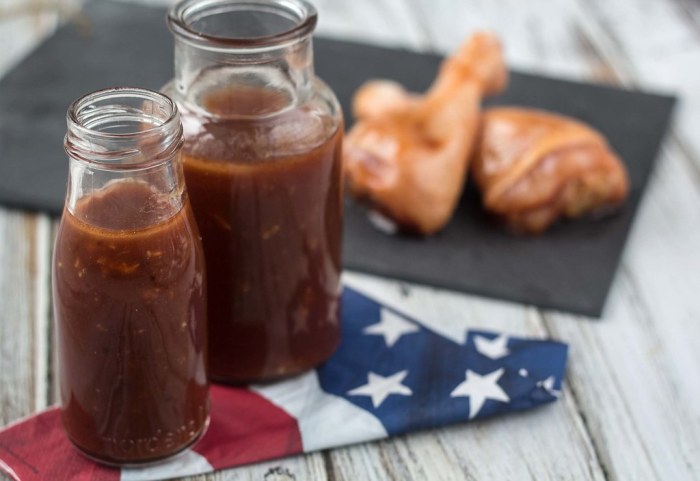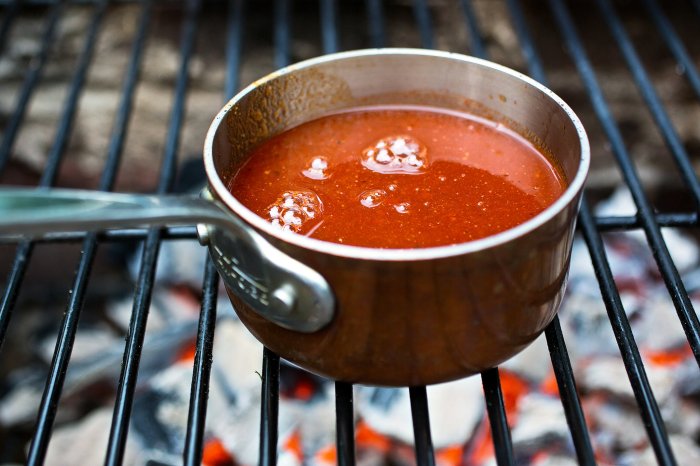Basic Barbecue Sauce Recipe A Comprehensive Guide
Basic Barbecue Sauce: A Comprehensive Guide: Basic Barbecue Sauce Recipe
Basic barbecue sauce recipe – Barbecue sauce, a cornerstone of American cuisine, boasts a rich and varied history, evolving from simple vinegar-based sauces to the complex, sweet, and spicy concoctions we know today. This guide delves into the fundamentals of creating a basic barbecue sauce, exploring its key components, recipe variations, and culinary applications.
Introduction to Basic Barbecue Sauce

Source: staticflickr.com
Barbecue sauce’s history is deeply intertwined with the evolution of barbecue itself. Early versions were primarily vinegar-based, reflecting regional preferences and readily available ingredients. The addition of tomatoes, sugar, and spices broadened the flavor profile, creating the diverse range of sauces we enjoy today. A basic barbecue sauce typically consists of tomatoes, vinegar, sugar, and a blend of spices.
The balance of these components determines the sauce’s sweetness, tanginess, and overall flavor profile.
Ingredient Exploration: Key Components, Basic barbecue sauce recipe
Each ingredient plays a crucial role in shaping the final flavor of the barbecue sauce. Tomatoes provide body and sweetness; vinegar offers acidity and tang; sugar balances the acidity and adds sweetness; while spices contribute depth and complexity. The type of vinegar significantly impacts the flavor. Apple cider vinegar lends a fruity sweetness, while white wine vinegar provides a sharper, brighter taste.
Brown sugar offers a richer, molasses-like flavor compared to the cleaner sweetness of granulated sugar. Common barbecue spices such as paprika, garlic powder, onion powder, and black pepper add warmth and savory notes.
The choice of tomato also influences the final product. Different varieties offer varying levels of sweetness and acidity.
| Tomato Type | Sweetness | Acidity | Suitability for BBQ Sauce |
|---|---|---|---|
| Roma | Medium | Medium | Excellent; meaty texture |
| Heirloom | High (varies by variety) | Low (varies by variety) | Good; adds unique flavor complexity |
| Cherry | High | Low | Good for adding sweetness; may need thickening |
| Crushed Tomatoes (canned) | Medium | Medium | Convenient; consistent results |
Recipe Variations and Customization
The beauty of barbecue sauce lies in its adaptability. Adjusting the balance of sweet and spicy elements, along with the consistency, allows for endless variations. The following recipes offer a starting point for experimentation.
- Mild & Sweet: Emphasizes tomato sweetness and a gentle vinegar tang. Use apple cider vinegar and brown sugar.
- Tangy & Spicy: Features a strong vinegar bite and a kick of heat. Use white wine vinegar and add cayenne pepper or chili powder.
- Smoky & Savory: Incorporates liquid smoke for a smoky flavor and a touch of molasses for depth. Use a blend of brown and granulated sugar.
To achieve a thicker consistency, simmer the sauce longer or add a cornstarch slurry. For a thinner sauce, add more liquid (water or vinegar).
Cooking and Storage Methods
Simmering the barbecue sauce allows the flavors to meld and deepen. A low simmer for at least 30 minutes is recommended. Proper storage is essential for maximizing shelf life. Store homemade barbecue sauce in airtight containers in the refrigerator for up to a week. To prevent separation, stir well before each use.
Canning or freezing are options for longer-term storage, although canning requires proper sterilization techniques to prevent spoilage.
Serving Suggestions and Pairings
Barbecue sauce enhances a wide array of dishes. Its versatility allows it to complement various meats and flavors.
A basic barbecue sauce recipe often centers around simple ingredients like ketchup, vinegar, and brown sugar. However, if you’re looking for something a bit more sophisticated to complement pasta, consider exploring alternative options; for instance, you might find inspiration in a sauce for ravioli recipe , which could offer interesting flavor profiles to adapt for a unique barbecue sauce twist.
Returning to the barbecue sauce, remember that experimentation with spices is key to achieving your desired flavor.
| Dish | Recommended Sauce Profile | Visual Appeal | Textural Contrast |
|---|---|---|---|
| Pulled Pork | Mild & Sweet | Rich, glossy coating | Sauce’s stickiness contrasts with the tender pork |
| Grilled Chicken | Tangy & Spicy | Vibrant color, glossy sheen | Sauce’s thin consistency coats the chicken evenly |
| Ribs | Smoky & Savory | Dark, rich color, sticky glaze | Sauce’s thickness adds a delightful textural element to the ribs |
Illustrative Examples of Basic Barbecue Sauce Applications

Source: vistapointe.net
Imagine the glistening, ruby-red hue of the Mild & Sweet sauce coating tender, slow-cooked pulled pork, its aroma a blend of sweet tomatoes and smoky wood. The taste is a harmonious balance of sweetness and tang, the texture luscious and sticky. The Tangy & Spicy sauce, a deep crimson with flecks of chili, adds a fiery kick to grilled chicken, its vibrant color contrasting beautifully with the golden-brown meat.
The smoky aroma hints at the underlying spice. The Smoky & Savory sauce, a dark, almost black glaze, clings richly to fall-off-the-bone ribs, its smoky fragrance and complex flavor profile a testament to slow cooking and careful seasoning. The texture is thick and glossy, providing a delightful textural contrast to the tender meat.
The visual appeal of the sauces is equally striking. The Mild & Sweet sauce is a bright, appealing red, with a smooth, glossy consistency. The Tangy & Spicy sauce boasts a deeper, richer red, its texture slightly thinner. The Smoky & Savory sauce is a dark, almost black, with a thick, glossy sheen.
FAQ Compilation
Can I use canned tomatoes instead of fresh?
Yes, canned tomatoes work well, especially diced or crushed. Just be mindful that the flavor might be slightly different than fresh tomatoes.
How long will homemade barbecue sauce last in the refrigerator?
Properly stored in an airtight container in the refrigerator, homemade barbecue sauce should last for about 1-2 weeks.
What can I do if my barbecue sauce is too thick or too thin?
To thin it, add a little water or vinegar. To thicken it, simmer uncovered for a longer period to reduce the liquid.
Can I freeze barbecue sauce?
Yes, freezing barbecue sauce is a great way to extend its shelf life. Allow it to cool completely before freezing in airtight containers.













